Most of the time, we don’t think about our car batteries. They live under the hood or in the trunk and do what we ask of them. But sometimes, you will need to charge your battery, if the car has been unused for a while, for example.
But can you overcharge a car battery?
The quick answer is yes, you can overcharge a car battery. The long answer, which we cover below, explains what causes the overcharging of battery and how to avoid it.
Can You Overcharge A Car Battery?
Yes, overcharging a car battery is possible.
The vast majority of car batteries on the market are lead-acid, which can stand a certain amount of overcharging. The real problem is if the overcharging is continuous, even at low levels. This will eventually boil the battery dry and damage the internal lead plates.
Can you ruin a battery by overcharging it?
Yes, overcharging a car battery can easily damage it beyond repair. Once a battery reaches its full charge level, the charger’s excess current breaks down the electrolyte. This process releases oxygen and hydrogen.
With a trickle charger, the release of gases is low, and it’s vented to the atmosphere. This is the reason for the small plastic tube attached to vented batteries. It takes away the highly corrosive acid mix.
Excessive overcharging causes two fundamental problems:
- Increased production of gasses, causing pressure to build up inside the battery.
- Increased internal heating of the batter: this causes the lead plates to buckle and short.
If the overcharging is terrible enough, the pressure can get so high that the battery explodes. Hydrogen and oxygen are a very explosive mix, and just a small spark can ignite it.
An exploding battery is bad enough, but it will also spray around the immediate area. That’s something you don’t want to be near.
Overcharging car battery symptoms
Battery overcharging can be a problem for car batteries. There are some telltale signs to look out for whenever you open the hood or have the car serviced.
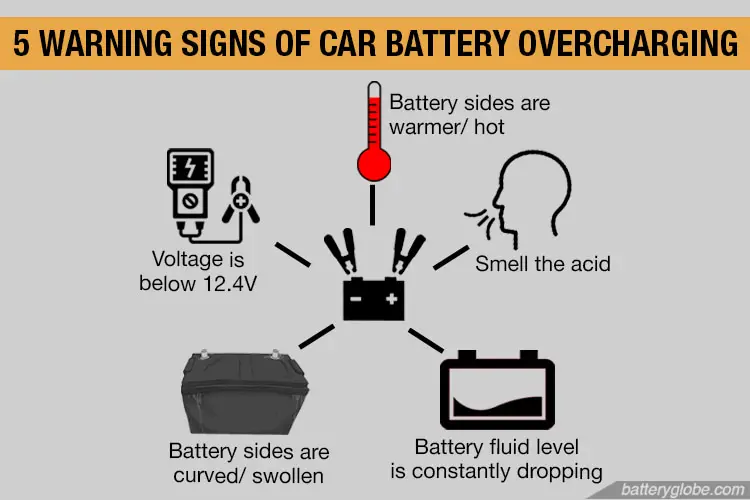
#1 Symptom: If you can touch the battery sides, they should generally be cool. If the sides are warm or even hot to the touch, it indicates overcharging. You need to do this check after driving the vehicle for at least 30 minutes or more.
#2 Symptom: If overcharging has been occurring for some time, you may see that the battery sides are curved. When overcharging for a long time, the overproduction of gasses inside the battery causes this swelling and bulging.
The problem must be found and fixed, and the battery replaced ASAP.
#3 Symptom: If your battery fluid level is constantly dropping and you need to keep topping it up, this is a sure sign of overcharging.
#4 Symptom: You may smell the acid being boiled off because of overcharging, but this is rare.
#5 Symptom: The only exact way to check for overcharging is by measuring the voltage across the battery. When the vehicle engine is off and all the accessories are turned off, the voltage across the terminals should be around 12.6 volts.
Now start the vehicle and measure again. You will need an assistant for this as the engine revs need to be increased a little as you measure. With the engine running, the alternator is supplying a charging current to the battery.
Ask your assistant to increase the engine revs gradually. The voltage should rise to a maximum of around 14.2 volts. If you have a higher voltage than this, then your regulator is most likely defective.
How to fix an overcharged car battery?
In most cases, your battery has been overcharged, it won’t be repairable. Taking a battery apart to replace the lead plates is just not cost-effective.
However, you can recondition your car battery by using Epsom salt and distilled water. It helps bring your dead car battery by cleaning it of sulfates and replenishing it with electrolytes.
There are some battery re-conditioners on the market, but the rate of success is not too high. A re-conditioner may also cost more than a new battery, so it’s cheaper in the long run to replace the battery.
However, if you have more than 1 car battery and want to recondition as well as extend their life, buy a Battery Charger with Recondition Feature here:
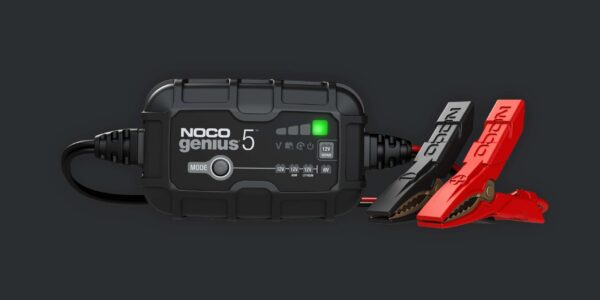
NOCO GENIUS5 Battery Reconditioner
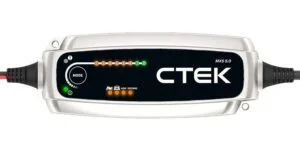
CTEK MXS 5.0 Battery Reconditioner
Take a look at the below infographic to get summarised information about the car battery overcharging problem.
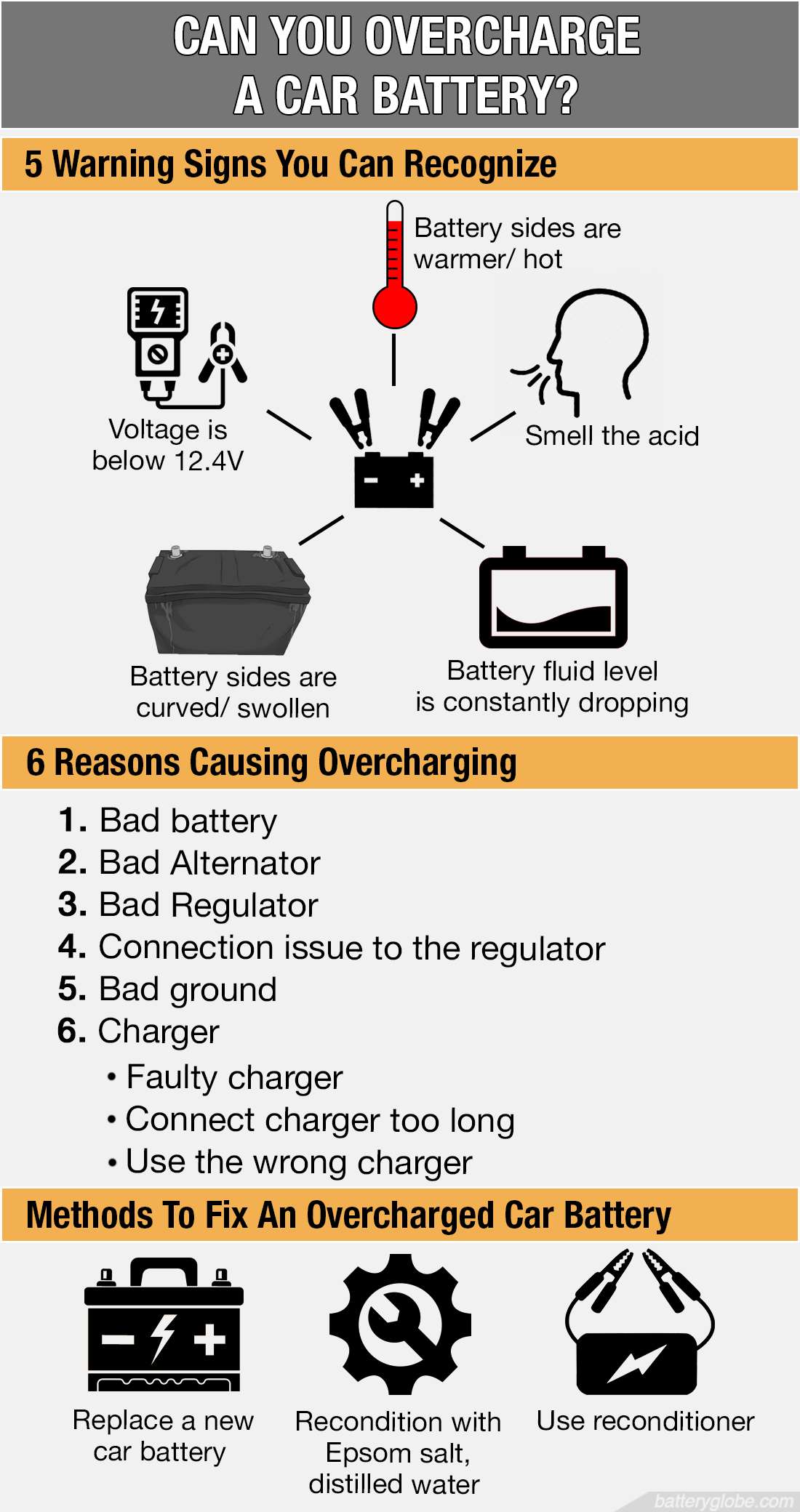
Can A Bad Battery Cause Overcharging?
Yes, this is possible. A bad battery will give a false voltage reading to the car’s charging system. This, in turn, can cause the alternator to increase its voltage output to charge the battery.
Because the bad battery cannot hold a charge, the alternator keeps on trying to charge. This causes the alternator to overheat, causing it to fail eventually if you do not replace the battery.
Other reasons causing overcharging
Bad Alternator: An alternator that’s not providing enough voltage will eventually kill your battery. But it’s also possible for an alternator to overcharge. It may be the wrong alternator has been fitted, or it is providing too much voltage. Both problems can overcharge the battery.
Bad Regulator: The regulator is a small electronic component that controls the maximum voltage supplied to the battery. It is usually part of the alternator on cars. If it’s not working, your battery will either overcharge or undercharge.
Connection issue to the regulator: If you suspect an overcharging problem, make sure all the charging system connections are good. Particularly the connection to the alternator.
Bad ground: The regulator needs a good connection to the ground. It uses the ground as a reference to control the voltage it’s supplying from the alternator. It could fool the regulator into thinking the voltage is lower than it is with a faulty ground connection. This, in turn, will cause overcharging.
Charger: There are several reasons a charger may cause overcharging:
- Faulty charger.
- Leaving the charger connected for too long. If you are not using a smart charger, then you must disconnect the charger once the battery is fully charged.
- Using the wrong charger. For example, deep cycle batteries need a charger that provides a low current for charging. A fast charger can damage a deep cycle battery.
Tips For Charging A Car Battery
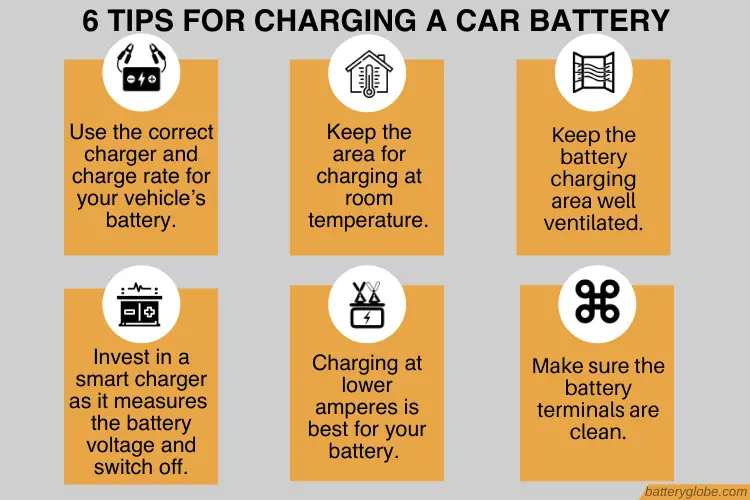
- Use the correct charger and charge rate for your vehicle’s battery.
- Keep the area for charging at room temperature. Too cold or too hot can affect charging rates.
- Keep the battery charging area well ventilated.
- Invest in a smart charger. These regularly measure the battery voltage and switch off when a full charge is reached.
- Charging at lower amperes is best for your battery. It takes longer but increases the battery’s life.
- Make sure the battery terminals are clean.
See Smart Charger for sale here:
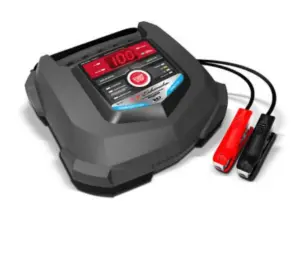
Schumacher SC1280 Smart Charger

Noco Genius5 Smart Charger
FAQs
Can you overcharge an electric car battery?
The short answer is no. Electric cars have a built-in battery management system that disconnects the charger when the full charge level is achieved. This is similar to mobile phones and laptop batteries that have protection circuits.
The only potential problem is leakage current. The solid-state components of the charging circuit can sometimes allow a very low current through. This may cause minimal damage, but charging circuits are continually improving. It’s not something to worry about.
Can you overcharge a car battery with a trickle charger?
Yes. A trickle charger provides a low current to the battery for slow charging. If it does not have a built-in automatic cutoff, it will continue to provide the current even when the battery is fully charged.
How long should a car battery take to charge a car battery?
The simplest method is to work out charging time from the charger amps and the battery amp-hour rating. If a battery is 100 amp-hour, and the charger supplies 2 amps: 100 / 2 = 50 hours.
However, the initial starting voltage of the battery also affects. You can calculate a more accurate time using this battery charging time calculator.

